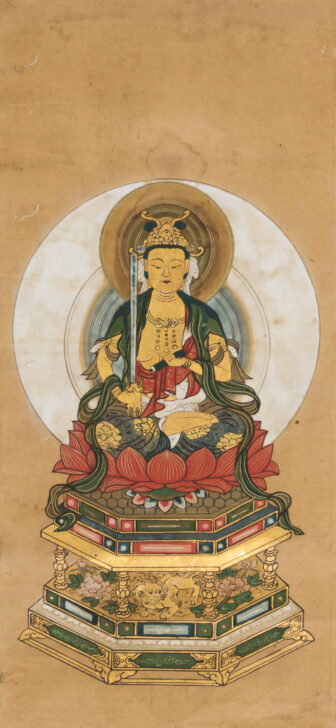Bodhisattva Manjusri (Monju Bosatsu)
Japanese

Description
Recent Acquisitions Part II
March 31-August 5, 2012
Bodhisattva Manjusri (Monju Bosatsu)
Japan
Edo Period (1615–1868)
17th century
Hanging scroll, ink, and color on paper
Gift of Ellen and Richard Laing, 2006/2.10
Subject Matter:
One of the most popular bodhisattvas in Japan, Monju (Sanskrit Mañjuśrī) was venerated as the bodhisattva of wisdom. Believed to be a disciple of the historical Buddha (Shakyamuni), Monju represented the enlightened mind and the teachings of the Buddha. Monju’s iconography speaks to his close association with wisdom and Buddhist teachings: the vajra sword represents cutting through the ignorance and illusions of the unenlightened mind, while the scroll is the Perfection of Wisdom Sutra (Japanese: Hannya-kyō; Sanskrit: Prajñāpāramitā sūtra). Monju’s typical mount of a lion, included in this image as a smaller attribute is symbolic of Buddhism’s ability to overcome obstacles through the strength of its voice. Monju is also directly associated with Yuima (Sanskrit: Vimalakīrti), a layman with a deep understanding of Mahayana Buddhist teachings. The sutra Yuima-kyō tells of a debate between Monju and Yuima where the latter demonstrates his greater understanding of Buddhism’s teachings.
Physical Description:
This hanging scroll depicts Monju (Sanskrit: Mañjuśrī), the bodhisattva of wisdom, seated on a lotus pedestal, holding his typical attributes of a vajra sword and a scroll. His typical lion mount is depicted underneath the base of lotus surrounded by peonies.
Usage Rights:
If you are interested in using an image for a publication, please visit https://umma.umich.edu/request-image/ for more information and to fill out the online Image Rights and Reproductions Request Form.